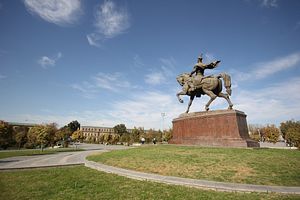It was one of the earliest, and most exciting, reforms announced: Uzbekistan was going to throw open the doors and toss out onerous visa procedures for a litany of countries. But a month after announcing the visa-free plan, Tashkent punted the changes to 2021, claiming the need for time to develop the necessary resources.
For many regional watchers, the announcement and quick reversal revealed hints of a power struggle in Tashkent. As new Uzbek President Shavkat Mirziyoyev gradually sidelined his rivals, one stayed exactly where Islam Karimov had put him: Rustam Inoyatov, the head of the National Security Service (SNB). The SNB, rumors held, had opposed the visa changes.
Last week, Inoyatov was dismissed from his position at the SNB. He was appointed a presidential advisor and given a Senate seat, a less-powerful position but also one that comes with immunity from prosecution.
Soon after Inoyatov’s departure from the SNB, Uzbekistan announced visa changes once more.
As of February 1, simplified procedures for issuing tourist visas will be introduced for citizens of 39 countries, including those on the European Union, many in East Asia and the Middle East, as well as India and the United States. The simplified procedure reportedly removes the requirement for a voucher or letter of invitation and shortens the timeline for issuing a visa to two days.
Citizens of seven countries — Israel, Indonesia, South Korea, Malaysia, Singapore, Turkey, and Japan — will be allowed 30 days visa-free travel in Uzbekistan, as of February 10.
Additionally, the promise of an electronic entry visa system, which had earlier been pushed back to 2021, was moved forward to July 2018.
The visa changes fit into a state development program signed by Mirziyoyev in late January, which outlined five priority areas for the state through 2021. Under the economic development and liberalization priority area is diversification of industries, including development of the country’s tourism sector. The visa-free regime and simplified procedures are a no-brainer if Uzbekistan wants to boost its tourism industry.
As Bruce Pannier outlined in a brilliant piece this weekend, Mirziyoyev has carefully and gradually concentrated power in his own hands:
Mirziyoev appears to have neutralized potential rivals, filled top state posts with friends and loyalists, reached some sort of arrangement with powerful “business” figures in Uzbekistan, built up a support base among the population, and, importantly, met with top world leaders who have heartily and publicly endorsed him as Uzbekistan’s new president.
Inoyatov was viewed by many as a significant roadblock to reform in Uzbekistan. With him set aside, Mirziyoyev’s excuses for delayed reforms dwindle. And as time passes, Mirziyoyev — who, it should be remembered, spent 13 years as Karimov’s prime minister — will have to bear the weight of responsibility for Uzbekistan and for Tashkent’s policies and actions.
Visa reform for foreign citizens is low-hanging fruit. Arguably, the abolition of exit visas for Uzbek citizens is a more meaningful benchmark. While opening the country to foreigners is a welcome move, Uzbek citizens are still restricted in their own travels. Currently, Uzbekistan is set to get rid of the system — which requires Uzbek citizens to get a visa to travel beyond countries of the CIS — as of January 1, 2019.
































